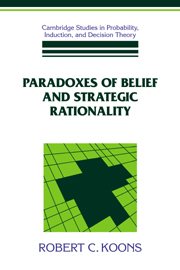Book contents
- Frontmatter
- Contents
- Preface
- Introduction
- Part I Paradoxes
- 1 Doxic paradoxes without self-reference
- 2 Doxic paradoxes and reputation effects in iterated games
- 3 A study of liar-like epistemic paradoxes
- 4 A computational account of mutual belief
- Part II Solutions
- Conclusion
- Appendix A Applying probability to mathematical sentences
- Appendix B Proofs of Theorems 2 and 3 from Chapter 6
- Appendix C On schematic generalization
- Bibliography
- Index
1 - Doxic paradoxes without self-reference
Published online by Cambridge University Press: 06 January 2010
- Frontmatter
- Contents
- Preface
- Introduction
- Part I Paradoxes
- 1 Doxic paradoxes without self-reference
- 2 Doxic paradoxes and reputation effects in iterated games
- 3 A study of liar-like epistemic paradoxes
- 4 A computational account of mutual belief
- Part II Solutions
- Conclusion
- Appendix A Applying probability to mathematical sentences
- Appendix B Proofs of Theorems 2 and 3 from Chapter 6
- Appendix C On schematic generalization
- Bibliography
- Index
Summary
PARADOX IN OPERATOR LOGIC
Both Richard Montague and Richmond Thomason have taken their discoveries of liar-like paradoxes in certain epistemic and doxic logics as a compelling reason for representing such notions only in languages in which no pernicious self-reference is possible. This can be achieved by representing the relevant epistemic or doxic notion by means of a sentential operator, rather than as a predicate of sentences (or of other entities with syntactic, sentence-like structure).
If it is possible to construct self-referential propositions (objects of evaluation, things that can be true or be believed), then we must consider such paradoxical sentences as ‘This sentence is not true’, ‘This sentence is not knowable’, or ‘This sentence is not rationally credible’. A sentence that asserts, in effect, that it is not true is called a “liar,” the traditional name of the paradox of Epimenides. If we assume that the liar is not, then it is not true, since that is what it asserts. But if we try to conclude that the liar is not true, then we seem to be forced to admit that it is true after all, since its nontruth is exactly what it asserts. Trying to evaluate the liar sentence forces us to contradict ourselves. The intensionalist seeks to avoid this contradiction by banishing self-referential objects from the domain of evaluation.
Nicholas Asher and Hans Kamp, as well as Donald Perlis, have shown that this strategy (called the “intensionalist” approach) alone is not enough to block the construction of paradoxes.
Information
- Type
- Chapter
- Information
- Paradoxes of Belief and Strategic Rationality , pp. 13 - 23Publisher: Cambridge University PressPrint publication year: 1992
